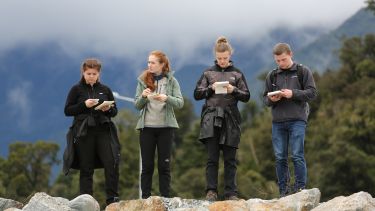Our fieldwork philosophy
We believe that fieldwork is integral to geography* and environmental sciences*, as subjects which fundamentally aim to understand the world we live in.

Experiential learning underpins and reinforces understanding of theory and concepts gained from lectures and reading.
Fieldwork stimulates academic curiosity, hones observation and measurement skills, exposes our students to key challenges and issues of global societal importance, and allows students to make connections between social, physical and environmental processes at different scales.
Our fieldwork locations reflect our belief that fascinating geography exists on our doorstep.
Local destinations**
The School of Geography and Planning is located in an amazing natural laboratory on the doorstep of the engaging Peak District National Park.
Students can easily explore the physical landscape of the Peak District, the challenges associated with living, working and farming in the country's oldest National Park. Sheffield has a rich cultural and social heritage with environmental processes and issues arising from the interconnected human and natural environment.
We typically run residential and day trips in locations such as the Edale Valley and the areas around Castleton for our Level 1 students.
Students also have the opportunity to spend the day volunteering at a local co-operative and getting involved in community activities.
National & International destinations**
Accessible and supportive fieldwork
We plan and conduct our fieldwork to be as inclusive and accessible as possible, always considering the wellbeing, mental and physical health of students and staff, and all those who we encounter on fieldwork.
Costs
We are committed to making our undergraduate field classes financially inclusive - Costs for the core field classes at Levels 1 and 2 are are met by the school, this includes the costs of travel, accommodation and food during your residential stay.
Students are expected to purchase their own personal equipment (eg appropriate clothing and footwear) for field class attendance, and to fund aspects of the Level 3 dissertation project if their project involves fieldwork (eg travel, food and accommodation).
What to expect during your degree
At Level 1 you will learn and apply essential field skills such as qualitative techniques, environmental sampling and laboratory analyses in Sheffield and the surrounding Peak District.
This typically includes a residential field class to the Peak District in the first semester that also helps you to get to know staff and your fellow students.
At Level 2 you will be introduced to more advanced techniques and have the opportunity to develop and apply your research skills.
Key areas of learning include observational skills and fieldwork planning, and specific methods of measurements and of qualitative/quantitative data collection.
This is coupled with analysis and interpretation of results. A strong emphasis is placed on group work.
On the residential field class at this level, you will undertake a small group project in the field and present your findings. The experience gained will give you insights into different approaches and challenges of field-based inquiry, and resonate with what you learn about research design as another part of the module.
It will also give you a first taste of independent field working in a small group setting. This experience forms a vital foundation of any fieldwork you tackle in Level 3, in your independent research project (dissertation).
Geography residential field classes at Level 2 are typically seven days in a European destination; Environmental Science residential field class is typically UK based for six days.
*Information on this page relates to our undergraduate Geography and Environmental Science courses. Specific information on field classes for the BA Global Sustainable Development can be found on the course homepage.
**The content of our courses, including field class destinations, is reviewed annually to make sure it's up-to-date and relevant. Note that the destinations of core and optional field classes, whether national or international vary by programme.

International undergraduate scholarships
We are offering scholarships of £2,500 for each year (subject to a 60% average) of your undergraduate degree. The maximum value is £10,000 for four-year programmes.
